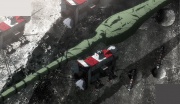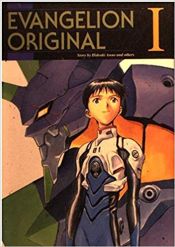Evangelion Original: Difference between revisions
No edit summary |
No edit summary |
||
| Line 13: | Line 13: | ||
EVANGELION ORIGINAL is a series of Evangelion companion books, in a total of three volumes. Noticeably, they contain the "original" script, the "definitive drafts" of episodes<ref>"In TV anime, as the staff meetings between producers and the directors proceed, the screenwriters write the script. The manuscript goes through the "first draft", "second draft", and the script becomes the "definitive draft." The director draws the storyboard based on the script that has become the "definitive draft". The storyboard is the movie’s blueprint, which has been filled in with the composition of each cut, acting, lines, second count and the like. In anime, the greater part of the director’s "directing" process occurs in the phase of drawing this storyboard. It is not unusual for the contents to change in the storyboard stage. There are also cases when it becomes almost a completely different story.<br>Among all 26 episodes of the TV version of “Neon Genesis Evangelion”, Director Anno himself wrote the scripts for five episodes, and is credited jointly with other screenwriters for the scripts of 20 episodes. The number of scripts that were jointly credited are the definitive drafts of scripts based on plots by director Anno written by screenwriters and gone over directly by director Anno. [..] Just by looking at these numbers, you will understand how much director Anno pulled the series together by his personal authorship." https://webcitation.org/5mYowhERa</ref> as reviewed by Anno before reaching the storyboard stage, usually with only minor changes relative to the episode as aired, though they are sometimes quite significant. Many episode titles are different, for instance. This is easily one of the most relevant materials to charter Evangelion's production. The books are as follows: | EVANGELION ORIGINAL is a series of Evangelion companion books, in a total of three volumes. Noticeably, they contain the "original" script, the "definitive drafts" of episodes<ref>"In TV anime, as the staff meetings between producers and the directors proceed, the screenwriters write the script. The manuscript goes through the "first draft", "second draft", and the script becomes the "definitive draft." The director draws the storyboard based on the script that has become the "definitive draft". The storyboard is the movie’s blueprint, which has been filled in with the composition of each cut, acting, lines, second count and the like. In anime, the greater part of the director’s "directing" process occurs in the phase of drawing this storyboard. It is not unusual for the contents to change in the storyboard stage. There are also cases when it becomes almost a completely different story.<br>Among all 26 episodes of the TV version of “Neon Genesis Evangelion”, Director Anno himself wrote the scripts for five episodes, and is credited jointly with other screenwriters for the scripts of 20 episodes. The number of scripts that were jointly credited are the definitive drafts of scripts based on plots by director Anno written by screenwriters and gone over directly by director Anno. [..] Just by looking at these numbers, you will understand how much director Anno pulled the series together by his personal authorship." - https://webcitation.org/5mYowhERa Evangelion Original I]</ref><ref> "This book is a collection of scripts for "Neon Genesis Evangelion." Excluding the stories whose scripts Anno handled directly, the scripts traced the following process in reaching the point of definitive drafts. First, Anno prepares an idea memo for each episode. The screenwriters write a script based on that memo and go through staff meetings that center on the director. On behalf of the staff, the screenwriters go through the second and third drafts. And then Anno directly corrects and revises the finished script and it is completed. As you’ll understand if you see the text, in scripts that are completed this way, the directions regarding the screen image are meticulous and the action and staging are quite concretely depicted. Therefore, the storyboard that is written in characters (letters), that is, the "wordboard-al" hue is also strong." - [https://webcitation.org/5mYowkBjV Evangelion Original III]</ref> as reviewed by Anno before reaching the storyboard stage, usually with only minor changes relative to the episode as aired, though they are sometimes quite significant. Many episode titles are different, for instance. This is easily one of the most relevant materials to charter Evangelion's production. The books are as follows: | ||
'' | '' | ||
Revision as of 01:29, 11 February 2021

|
"We've seen it. The proof of its construction was very useful." |

| |
| Title | EVANGELION ORIGINAL |
|---|---|
| Original Publication Date | July-November 1996 |
| Publisher | |
| Pages | |
EVANGELION ORIGINAL is a series of Evangelion companion books, in a total of three volumes. Noticeably, they contain the "original" script, the "definitive drafts" of episodes[1][2] as reviewed by Anno before reaching the storyboard stage, usually with only minor changes relative to the episode as aired, though they are sometimes quite significant. Many episode titles are different, for instance. This is easily one of the most relevant materials to charter Evangelion's production. The books are as follows:
- Evangelion Original I ISBN 4-8291-7321-1 C0076 P980E (episodes #1 - #9)
- Evangelion Original II ISBN 4-8291-7322-x C0076 P980E (#10- #18)
- Evangelion Original III ISBN 4-8291-7323-8 C0076 P980E (#19- #26)
Notes
Collection of translated material from Evangelion Original on Gwern's source anthology.
Evangelion Original, volume one, on Japanese Amazon.
One instance of potentially very helpful information that was ultimately cut: a date list for episodes 1-9. It also contradicts the timetable on Ayanami Raising Project, for instance, though that is hardly a trustworthy source.
- ↑ "In TV anime, as the staff meetings between producers and the directors proceed, the screenwriters write the script. The manuscript goes through the "first draft", "second draft", and the script becomes the "definitive draft." The director draws the storyboard based on the script that has become the "definitive draft". The storyboard is the movie’s blueprint, which has been filled in with the composition of each cut, acting, lines, second count and the like. In anime, the greater part of the director’s "directing" process occurs in the phase of drawing this storyboard. It is not unusual for the contents to change in the storyboard stage. There are also cases when it becomes almost a completely different story.
Among all 26 episodes of the TV version of “Neon Genesis Evangelion”, Director Anno himself wrote the scripts for five episodes, and is credited jointly with other screenwriters for the scripts of 20 episodes. The number of scripts that were jointly credited are the definitive drafts of scripts based on plots by director Anno written by screenwriters and gone over directly by director Anno. [..] Just by looking at these numbers, you will understand how much director Anno pulled the series together by his personal authorship." - https://webcitation.org/5mYowhERa Evangelion Original I] - ↑ "This book is a collection of scripts for "Neon Genesis Evangelion." Excluding the stories whose scripts Anno handled directly, the scripts traced the following process in reaching the point of definitive drafts. First, Anno prepares an idea memo for each episode. The screenwriters write a script based on that memo and go through staff meetings that center on the director. On behalf of the staff, the screenwriters go through the second and third drafts. And then Anno directly corrects and revises the finished script and it is completed. As you’ll understand if you see the text, in scripts that are completed this way, the directions regarding the screen image are meticulous and the action and staging are quite concretely depicted. Therefore, the storyboard that is written in characters (letters), that is, the "wordboard-al" hue is also strong." - Evangelion Original III
This article bears the unpleasant designation of "Stub." This is a Bad Thing. Provide a great service to NGE fan-geeks everywhere by making it awesomer!
